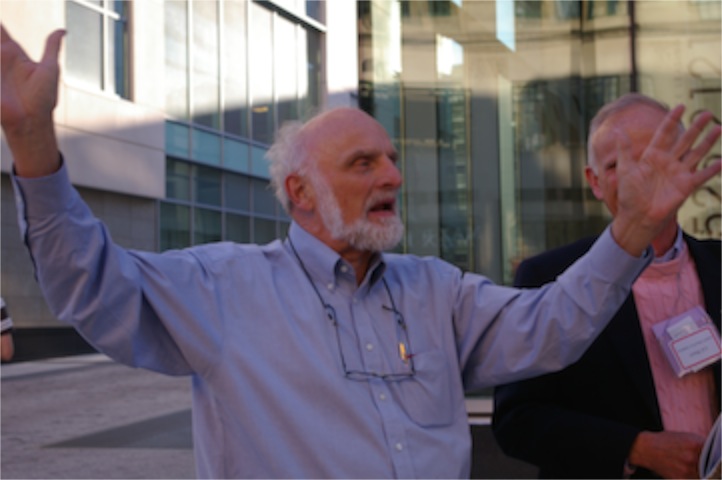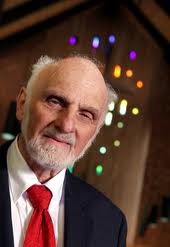Prophetic Imagination
24/01/12 04:42
About the time I graduated from seminary, Walter Brueggemann, then professor of Old Testament at Eden Theological Seminary, published a book entitled, “The Prophetic Imagination.” The book traces the development of the theology of Israel from Moses to Jesus in broad brush strokes. Moses’ radical vision gets translated into the centralization of power under Solomon and gives rise to a generation of critics of the centralization of wealth and power. These prophets, who spoke more in poetry than in political rhetoric, provided the context into which Jesus came into this world.
What Brueggemann makes clear in his book is that Biblical faith involves a counter cultural movement. To be faithful to the Bible involves being critical of the cultural status quo. This criticism, however, is far from “doom and gloom,” that is often associated with some readings of the prophetic literature. The prophets do not present a vision of an accelerated end of the world. On the contrary they say that the way things are now is not the only way that things can be. The result is a vision of the future that is genuinely hopeful.

For my whole career as a pastor, I have kept coming back to Brueggemann. He is faithful to the Biblical text and neither conservative nor liberal. He doesn’t take sides in many of the discussions and disagreements between Christians. He simply calls us to be faithful to the text. He has a way of challenging all Christians and inviting us to move away from our comfort zones into a faith that is deeper and more genuinely Biblical. He can be disruptive and beautiful, critical and hopeful, challenging and comforting all at the same time without any of those qualities coming into conflict with each other. He has a deep sense of humor and a feel for the artistic in the poetry of the Bible.
I have met him only on a couple of occasions, but I have had the opportunity to hear him preach and teach and to experience the power of his presence. Through these contacts and through his books, he has become a mentor for me. His prayers and preaching inspire me. I know that I will never be as gifted in either area as he, but reading his prayers and sermons does not show me what I cannot become, but rather challenges me to become more than I currently am.
So I have tried to learn the art of prophetic imagination.
I have tried to learn the poetry of challenging God’s people.
There is no question that in our time we need prophetic voices. We have become too attached to our wealth and too unwilling to share. We have become too self-righteous in our positions and too unwilling to listen. We have become too self-absorbed and too unwilling to follow God’s call. This is true of us as individuals and it is true of us as congregations.
Too often our congregation chooses safety over service. And ours is a genuinely caring and faithful congregation. It is not some character flaw in the members of the church, it is a failing of the prophetic voice to communicate.
To listen to the prophetic voice is to engage in the hard, life-long work of letting go of what is comfortable for the sake of what is important.

I take Brueggemann’s challenge to preachers very seriously. He pulls no punches when he addresses us. He calls us to proclaim that our well-being is intimately bound up in the well-being of others. He reminds us to rediscover the meaning and the practice of mercy. Brueggemann speaks of the “mangled prose” of too many preachers and calls us to transcend it with meaningful and life-giving poetry that speaks to the people in the midst of their lives and calls them to a new way of living.
It is not that easy to be a poet in the pulpit. For the past month, I have been mixing things up with my sermons. Whereas I have often employed a storytelling style and spoken from my heard in the midst of the sanctuary, I have returned to carefully crafted manuscripts and practiced delivery from the pulpit. I don’t intend to give up other styles, but rather to put more effort, more energy and more commitment into my preaching. I look at the videos and I understand that I have not yet achieved the right mix. I have focused a bit too much on what I wanted to say and a bit too little on the call of the Biblical text. I don’t want to just be a teacher, but it wouldn’t hurt for me to be a bit more careful in my research and to invite worshipers to enter a bit more deeply into the text.
The reality is that the Gospel shakes up the status quo and I have become a part of the status quo. I am associated not only with the institution of the church, but also with its stability. I am a keeper of traditions and a maintainer of the building. And change makes me as nervous as it does others. Change might mean that I don’t have as much security. Change might mean that I have to set aside my dreams of a comfortable retirement and replace them with a call to justice and a commandment to share all that I have.
Beyond these things, I find myself called to be a pastor to all of the people of the congregation – the old guard and the emerging new community. Often I try to strike some kind of balance between tradition and the future.
In the history of our people, genuine prophets are few and far between. Not every one of us is called to bring the poetic judgment to our generation. A prophet must always give voice to God’s word and not human words.
It is with humility and fear that I continue to approach the task of preaching the Gospel. I keep searching for the right words, listening more carefully and studying the scriptures more closely.
May the prophetic imagination find expression my words.
What Brueggemann makes clear in his book is that Biblical faith involves a counter cultural movement. To be faithful to the Bible involves being critical of the cultural status quo. This criticism, however, is far from “doom and gloom,” that is often associated with some readings of the prophetic literature. The prophets do not present a vision of an accelerated end of the world. On the contrary they say that the way things are now is not the only way that things can be. The result is a vision of the future that is genuinely hopeful.

For my whole career as a pastor, I have kept coming back to Brueggemann. He is faithful to the Biblical text and neither conservative nor liberal. He doesn’t take sides in many of the discussions and disagreements between Christians. He simply calls us to be faithful to the text. He has a way of challenging all Christians and inviting us to move away from our comfort zones into a faith that is deeper and more genuinely Biblical. He can be disruptive and beautiful, critical and hopeful, challenging and comforting all at the same time without any of those qualities coming into conflict with each other. He has a deep sense of humor and a feel for the artistic in the poetry of the Bible.
I have met him only on a couple of occasions, but I have had the opportunity to hear him preach and teach and to experience the power of his presence. Through these contacts and through his books, he has become a mentor for me. His prayers and preaching inspire me. I know that I will never be as gifted in either area as he, but reading his prayers and sermons does not show me what I cannot become, but rather challenges me to become more than I currently am.
So I have tried to learn the art of prophetic imagination.
I have tried to learn the poetry of challenging God’s people.
There is no question that in our time we need prophetic voices. We have become too attached to our wealth and too unwilling to share. We have become too self-righteous in our positions and too unwilling to listen. We have become too self-absorbed and too unwilling to follow God’s call. This is true of us as individuals and it is true of us as congregations.
Too often our congregation chooses safety over service. And ours is a genuinely caring and faithful congregation. It is not some character flaw in the members of the church, it is a failing of the prophetic voice to communicate.
To listen to the prophetic voice is to engage in the hard, life-long work of letting go of what is comfortable for the sake of what is important.

I take Brueggemann’s challenge to preachers very seriously. He pulls no punches when he addresses us. He calls us to proclaim that our well-being is intimately bound up in the well-being of others. He reminds us to rediscover the meaning and the practice of mercy. Brueggemann speaks of the “mangled prose” of too many preachers and calls us to transcend it with meaningful and life-giving poetry that speaks to the people in the midst of their lives and calls them to a new way of living.
It is not that easy to be a poet in the pulpit. For the past month, I have been mixing things up with my sermons. Whereas I have often employed a storytelling style and spoken from my heard in the midst of the sanctuary, I have returned to carefully crafted manuscripts and practiced delivery from the pulpit. I don’t intend to give up other styles, but rather to put more effort, more energy and more commitment into my preaching. I look at the videos and I understand that I have not yet achieved the right mix. I have focused a bit too much on what I wanted to say and a bit too little on the call of the Biblical text. I don’t want to just be a teacher, but it wouldn’t hurt for me to be a bit more careful in my research and to invite worshipers to enter a bit more deeply into the text.
The reality is that the Gospel shakes up the status quo and I have become a part of the status quo. I am associated not only with the institution of the church, but also with its stability. I am a keeper of traditions and a maintainer of the building. And change makes me as nervous as it does others. Change might mean that I don’t have as much security. Change might mean that I have to set aside my dreams of a comfortable retirement and replace them with a call to justice and a commandment to share all that I have.
Beyond these things, I find myself called to be a pastor to all of the people of the congregation – the old guard and the emerging new community. Often I try to strike some kind of balance between tradition and the future.
In the history of our people, genuine prophets are few and far between. Not every one of us is called to bring the poetic judgment to our generation. A prophet must always give voice to God’s word and not human words.
It is with humility and fear that I continue to approach the task of preaching the Gospel. I keep searching for the right words, listening more carefully and studying the scriptures more closely.
May the prophetic imagination find expression my words.